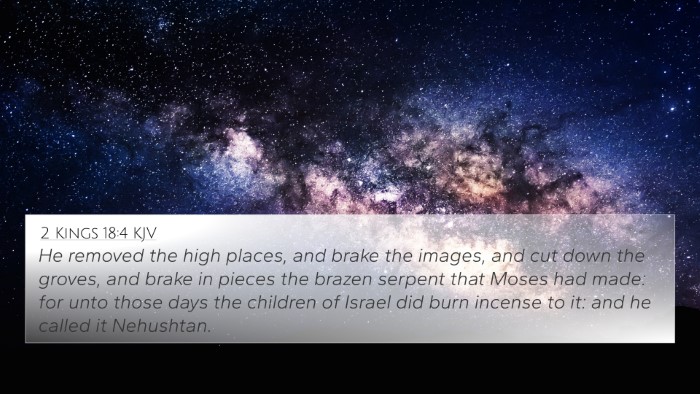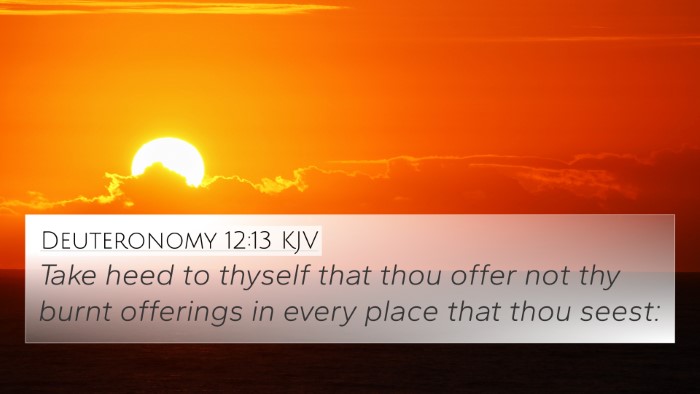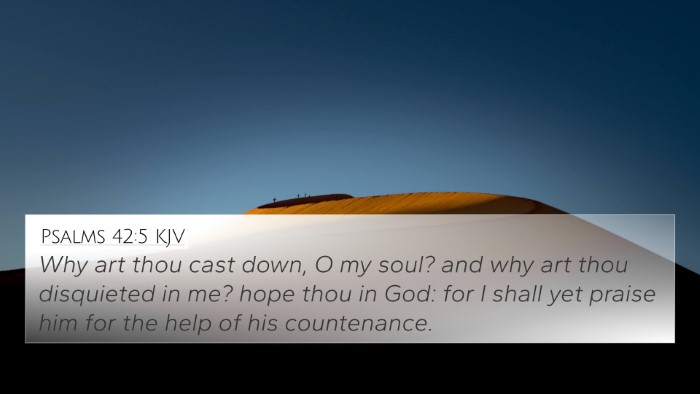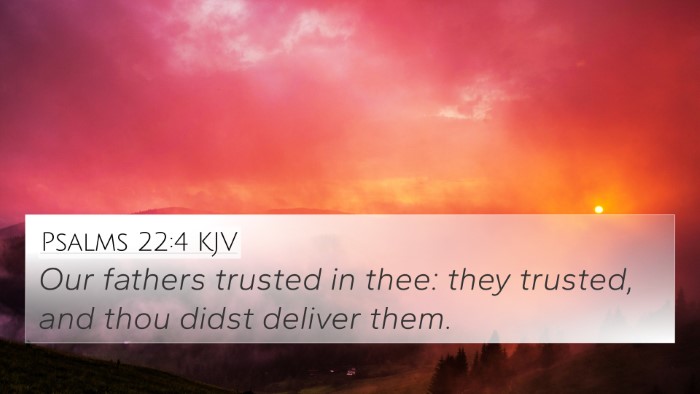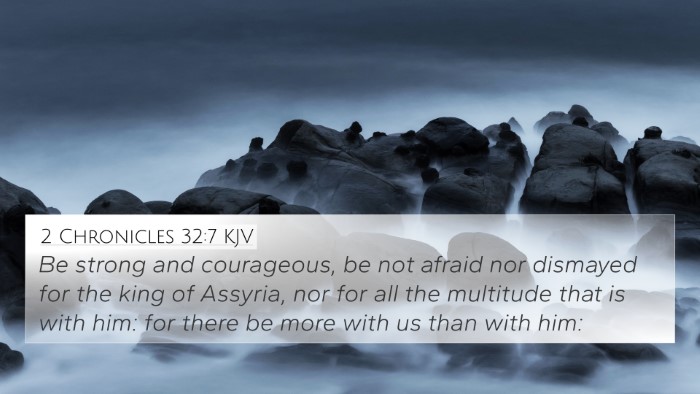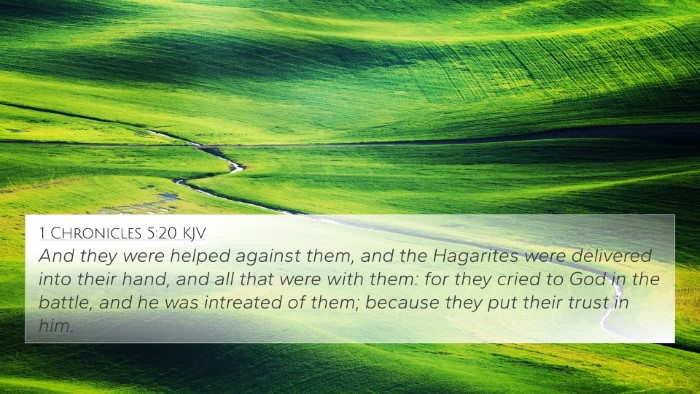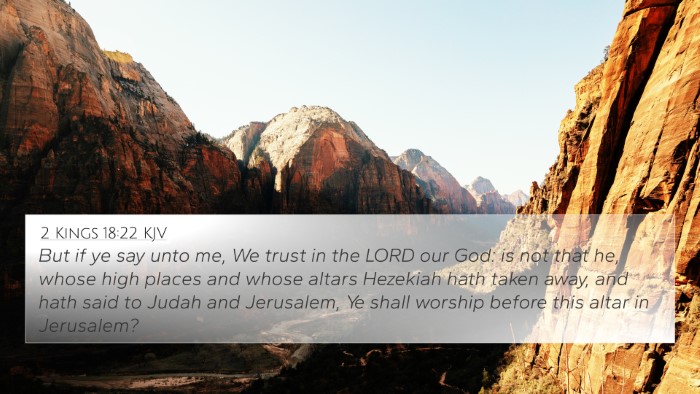Understanding Isaiah 36:7
Isaiah 36:7 presents a significant moment in the context of Israel's history, highlighting the challenges faced by the people of God during the Assyrian threat. Below we explore the insights from classic public domain commentaries, unraveling the rich meanings and contexts of this verse.
Verse Context
Isaiah 36:7 (KJV): "But if thou say to me, We trust in the Lord our God: is it not he, whose high places and whose altars Hezekiah hath taken away, and hath said to Judah and to Jerusalem, Ye shall worship before this altar?"
Commentary Insights
This verse features Sennacherib's Rabshakeh addressing the people of Jerusalem, attempting to undermine their trust in God by referencing King Hezekiah's reforms.
Matthew Henry's Commentary
Henry emphasizes the tactics of Rabshakeh, who aimed to instill doubt by questioning the effectiveness of Hezekiah’s reforms. He portrays a picture of the political and spiritual conflict, showing how the Assyrians sought to break the morale of God's people by attacking their faith and the integrity of their leader.
Albert Barnes' Commentary
Barnes highlights the importance of Hezekiah’s actions in removing high places and altars that were not ordained by God, illustrating a key theological shift. This act reflected reformative efforts to lead the people back to proper worship and reliance on God rather than on local practices that had diverged from divine commandments.
Adam Clarke's Commentary
Clarke underlines the psychological warfare employed by Rabshakeh. By acknowledging the changes made by Hezekiah, he attempted to create a rift between the people and their king, suggesting that these reforms had angered their God and left them vulnerable. Clarke indicates that this verse is a crucial turning point, inviting reflection on the nature of faith in times of crisis.
Thematic Connections
The message within Isaiah 36:7 resonates with many themes throughout Scripture, showing the perennial struggles of faith, leadership, and the confrontation of external threats.
Cross-References and Relationships
- 2 Kings 18:4-5: Discusses Hezekiah's reforms in removing high places.
- Isaiah 10:24-27: Prophecies about the Assyrian oppression and God’s plan to deliver His people.
- Jeremiah 17:5-8: A contrast between trust in man versus trust in God.
- Psalm 20:7: The significance of trust in the Lord rather than chariots and horses.
- Isaiah 37:10: A continuation of the Assyrian threat and God’s reassurance to Hezekiah.
- 2 Chronicles 32:10-15: Rabshakeh’s taunts and the defense of Jerusalem.
- Matthew 4:6: The devil's temptation and questioning God’s protection.
Fundamental Themes in Isaiah 36:7
In examining Isaiah 36:7, several fundamental themes emerge, revealing the interconnectedness of Scripture:
- Faith versus Fear: The struggle to maintain faith amid great adversity is a recurrent theme.
- Leadership and Responsibility: The actions of leaders like Hezekiah could profoundly impact their nations' spiritual standing.
- God's Sovereignty: The ultimate control God holds over nations and leaders is evident throughout this chapter.
Conclusion
Isaiah 36:7 serves as a powerful reminder of the tensions between faith and external pressures, the necessity of spiritual reforms, and the importance of maintaining trust in God amidst crises. Utilizing tools for Bible cross-referencing and thematic analysis opens doors to deeper understanding, inviting believers to explore similar passages that resonate with this struggle for faith and trust.
Getting Started with Cross-Referencing
To delve deeper into the interconnectedness of Bible verses, consider employing the following methods:
- Bible Concordance: Use a concordance to locate verses related to themes of trust, fear, and leadership.
- Comparative Studies: Analyze the similarities and differences between Old and New Testament references to trust.
- Cross-Reference Guide: Utilize available resources to discover extensive cross-references related to specific verses.
Closing Thoughts
Understanding Isaiah 36:7 illuminates the timeless principles of faith, leadership, and reliance on God, encouraging further study and reflection through cross-referencing Biblical texts. Connect the dots between verses to strengthen your understanding of God’s narrative throughout Scripture.



